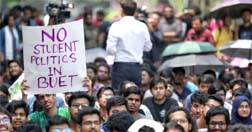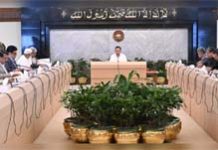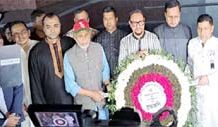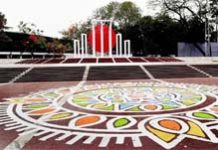C T Online Desk: Everyone is waiting, with bated breath, to see whether the government has really taken on board the message that true change needs to come.
We have been here many times before, but never with the urgency that we see today. In the past, the government has managed to get away with promising reform but never delivering it.
This time, however, it is different. This time the stakes are much higher, and the people of this country, and in particular the students, will not accept mere lip service as they have done in the past.
The government today faces a crisis of confidence and a crisis of its authority. It needs to understand that its authority lies in tatters, and the order of the day is to repair its relationship with its people, especially with the students and the younger generation, who have watched the shocking events of the past two weeks unfold with increasing dismay and disillusionment.
If the government doesn’t move quickly and decisively it will lose an entire generation. This is not the time for half-measures.
In this situation, what can the government do to signal that it is listening, that it is learning, and that it is committed to do things differently moving forward?
Difficult times require difficult solutions. They require big, bold gestures.
If the ruling party wishes to win back the confidence of the Bangladeshi people and the respect of the world, it can accomplish this in one fell swoop by decommissioning the BCL.
Let’s get one thing straight.
BCL today bears about as much resemblance to the Chhatra League of the 1960s that battled bravely on campus at the forefront of the liberation struggle as Donald Trump’s Republican Party does with the party of Abraham Lincoln.
Times change and political parties and their affiliate organizations change with them.
I do not want to hear the current crop of BCL cadres wrap themselves in the borrowed finery of the role played by the BCL in 1952 or the 1960s or the 1980s.
That was then, and this is now.
The current crop of BCL cadres were not even born when the BCL was in its heyday and a force for democratic rights without which we would not be independent today, and their criminality shames and dishonours their storied forebears.
We cannot look back to the glory days of student politics in the 1960s and the 1980s and the indispensable role played by the BCL then without recognizing that there is a massive difference between then and now.
There is obviously a difference between when the country is labouring under a military dictatorship and when it is a democracy.
When we are under military rule, then there is no alternative means to throw off the yoke of oppression other than violent agitation. At times like this, we needed the BCL, who were at the forefront of the resistance to military rule.
But this is very different from the role played by the BCL today.
In fact, the rich irony is that the very thing the BCL fought to establish during times of autocracy — the democratic rights of the people — is the very thing that it undermines today.
The bottom line is that in a democratic country there is no place for armed gangs who exist to commit acts of violence as an adjunct to state power, and the character of such an outfit is very different from when it exists to resist illegitimate authority wielded by an autocratic regime.
Now I fully understand why we have these structures and systems in place in Bangladesh.
I can see that having violent student fronts is like nuclear weapons — the other side has theirs, so you need to have yours, and unilateral disarmament is a risky proposition.
But let’s get real for a second. We are trying to build a democracy here.
If we truly want to turn Bangladesh into a developed country, then we need to get beyond the politics of violence.
We all understand that the recent tragedy was precipitated when the BCL were given the green light to storm in and violently break up the student protests. Until that moment, the protests had remained under control and largely peaceful.
The trouble is, as the adage goes, when the only tool you have is a hammer, every problem starts to look like a nail.
So what am I asking for? I am asking for something that should have happened years ago: A complete decommissioning of the BCL.
Not possible, you say, in a world where the other side has the JCD and Shibir?
I don’t buy it. How is it that other countries manage it perfectly well? Is Bangladesh so uniquely barbaric and uncivilized a country that we cannot?
The ruling party has been in power for 15 years. That is more than enough time to create a truly democratic platform for governance.
As long as we have these essentially criminal gangs in place as adjuncts to political power, we will never truly be a democracy. Nothing will change and nothing will get better.
And look at what it is doing to our universities.
Universities are meant to be citadels of learning, where the next generation is educated and nurtured, where they imbibe the values that will inspire them to build a better Bangladesh.
Is that what is happening in Bangladesh? What do our students learn from the environment that surrounds them at university, and is it conducive to the future growth of this country?
To ask the question is to answer it.
So where do we go from here?
We need to ban student politics. And by that I don’t mean we need to ban protests or organizing. That is fine. There is always space for peaceful protests such as the quota reform movement, and indeed we want our students to be conscientious and committed to change.
But what we need to ban is the violence, the intimidation, the gangsterism, and the criminality that defines student politics today. There can be no space for it.
Look what goes alongside the rule of student cadres on campuses — selling exam papers, selling of hostel beds, impunity for harassment, sexual assault and worse, the common students living in fear.
It is simply unacceptable in a country which aspires to decency and development. Bangladesh is better than this.
So let us begin the reform process with our university campuses. Let us turn our campuses back into seats of learning. What they once were when we used to call Dhaka University the Oxford of the East, and what they must again be, if we are to build a country and a society worthy of our people and our forebears.
We need to put education first. That is as good a place to start as any when it comes to reforming the country.
The student protesters, and indeed the rest of us as well, are looking for something tangible and meaningful from the government to show they mean business, that they are listening, that they have understood that things need to change.
Let’s start with our university campuses and wholesale reform of student life. It would go a long way to showing that the government is serious when it comes to learning from its mistakes of the past two weeks.














